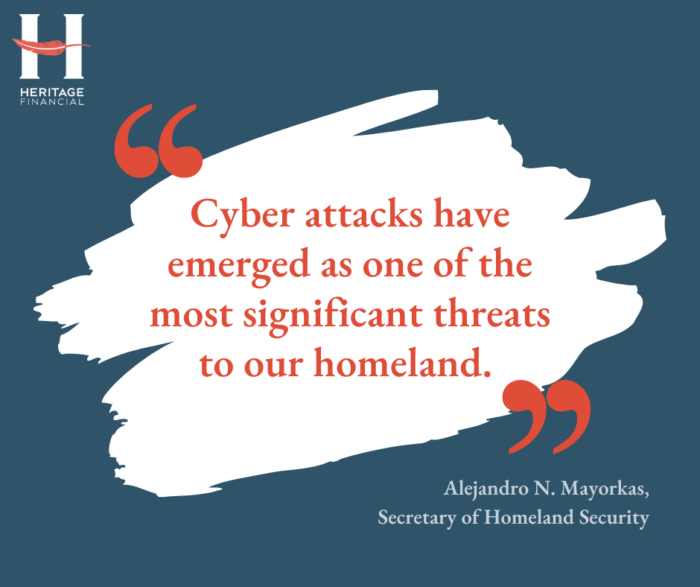With minimal risk and the potential for significant rewards for fraudsters, cybercrimes and fraud are a constant threat. While Heritage plays an important role in helping protect your assets, you can also take action to protect yourself and help secure your information. Following best practices and applying caution when sharing information or executing transactions makes a big difference. Here are some tips, best practices, and what actions to take if you suspect that your personal information has been compromised.
How we can work together to protect your information and assets
- Keep us informed regarding changes to your personal information.
- Expect us to call you to confirm email requests to move money, trade, or change account information.
- Establish a verbal password with our firm to confirm your identity.
How Schwab protects your account
Schwab takes your security seriously and leverages protocols and policies to help protect your financial assets. Below are actions you can take to reinforce their efforts and resources to assist you in keeping your account safe:
- Confirm your identity using Schwab’s voice ID service when calling the Schwab Alliance team for support.
- Use two-factor authentication, which requires you to enter a unique code each time you access your Schwab accounts.
- Review the Schwab Security Guarantee, which covers 100% of any losses in any of your Schwab accounts due to unauthorized activity.
What you can do
- Be aware of suspicious phone calls, emails, and texts asking you to send money or disclose personal information. If a service rep calls you, hang up and call back using a known phone number.
- Never share sensitive information or conduct business via email, as accounts are often compromised.
- Beware of phishing and malicious links. Urgent-sounding, legitimate-looking emails are intended to tempt you to accidentally disclose personal information or install malware.
- Don’t open links or attachments from unknown sources. Enter the web address in your browser.
- Check your email and account statements regularly for suspicious activity.
- Never enter confidential information in public areas. Assume someone is always watching.
- Set-up alerts on banking and credit cards to monitor real-time suspicious activity.
Exercise caution when moving money
- Leverage our electronic authorization tool to verify requests. Featuring built-in safeguards, this is the fastest and most secure way to move money.
- Review and verbally confirm all disbursement request details thoroughly before providing your approval, especially when sending funds to another country. Never trust wire instructions received via email.
Adhere to strong password principles
- Use upper- and lower-case letters, numbers, and symbols.
- Don’t include any personal information.
- Don’t use repeating characters.
- Store your passwords in a password manager, such as Keeper or 1Password.
- Enable 2-factor authentication on accounts, if available.
Maintain updated technology
- Keep your web browser, operating system, antivirus, and anti-spyware updated, and activate the firewall.
- Do not use free/found USB devices. They may be infected with malware.
- Check security settings on your applications and web browser. Make sure they’re strong.
- Turn off Bluetooth when it’s not needed.
- Dispose of old hardware safely by performing a factory reset and destroying all storage data devices.
Use caution on websites and social media
- Do not visit websites you don’t know, (e.g., advertised on pop-up ads and banners).
- Log out completely to terminate access when exiting all websites.
- Don’t use public computers or free Wi-Fi. Use a personal Wi-Fi hotspot or a Virtual Private Network (VPN).
- Implement Norton LifeLock and Norton 360 which establishes a VPN when using public wi-fi, blocks ads and also has a password management system.
- Hover over questionable links to reveal the URL before clicking. Secure websites start with “https,” not “http.”
- Be cautious when accepting “friend” requests on social media, liking posts, or following links.
- Limit sharing information on social media sites. Assume fraudsters can see everything, even if you have safeguards.
- Consider what you’re disclosing before sharing or posting your résumé.
What to do if you suspect a breach
- Call your Heritage Wealth Manager or your Schwab Alliance team immediately at 800-515-2157 so that they can watch for suspicious activity and collaborate with you on other steps to take.
- Freeze credit with all 3 credit bureaus.
- Request our “How to Respond to a Data Breach” flyer for more information.
Resources for more information and best practices
- 8 Cybersecurity Tips to Start using Today
- As you shop online, keep these 7 cybersecurity tips in mind
- StaySafeOnline.org: National Cybersecurity Alliance
- FTC Online Privacy and consumer advice
- FBI Scams and Safety website provides additional tips




